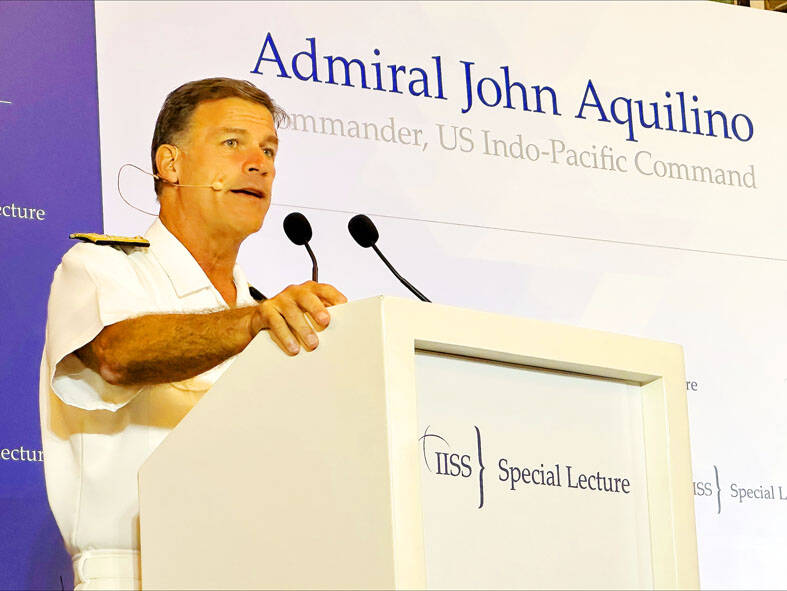US Indo-Pacific Commander Admiral John Aquilino on Tuesday said Washington must be ready to “fight and win” if it fails to deter China from taking military action against Taiwan.
Speaking during a US House of Representatives Armed Services Committee hearing, Aquilino declined to put a date on a possible Chinese invasion of Taiwan, saying that “for me, it doesn’t matter what the timeline is.”
“I’m responsible [for finding a way] to prevent this conflict today and — if deterrence were to fail — to be able to fight and win,” Aquilino said.

Photo: AP
Aquilino’s assessment that other top military commanders were “guessing” regarding the date contrasted with his predecessor, Admiral Philip Davidson, who suggested in 2021 that China could invade Taiwan within the next six to 10 years.
“There’s a ton of variables on what might motivate [Chinese] President Xi Jinping (習近平) to take that action,” Aquilino said. “It’s our job to convince him every day [that] it would be a bad choice.”
Aquilino added that estimates of a possible Chinese invasion of Taiwan were based on an order directing the Chinese military to develop the requisite military capability by 2027.
Asked if he believed the threat of a Chinese invasion had grown over the past few years, Aquilino said: “The trends for the threat are in a wrong direction... There’s no doubt about that.”
Aquilino said that the Pentagon and the US defense industry needed to move more quickly to reduce the odds of a conflict.
However, US military forces in the region are fully prepared for any scenario, Aquilino added.
In his opening comments, US Representative Mike Rogers, the committee chairman, expressed concern about Xi’s ambitions in the region.
Over the past decade, Beijing has tripled its military budget and is aggressively pursuing military modernization and expansion, Rogers said.
The military buildup is concerning, “but what’s most alarming is the increasingly provocative actions President Xi has taken in recent years,” he added, referencing military exercises around Taiwan and intimidation of US lawmakers for supporting Taiwanese democracy, among other examples.
“This is not how responsible nations act,” he said. “We have no choice but to take Xi’s threats seriously and we have to be resolute in our response.”
The US needs to work with its regional partners, as well as accelerate the provision of weapons and training to Taiwan so that it can defend its democracy, he said.
“But most importantly, we need to take action now,” he added. “China is not going to give us 10 or 20 years to prepare for conflict. We simply cannot procrastinate further.”
US Principal Deputy Assistant Secretary of Defense for Indo-Pacific Security Affairs Jedidiah Royal in his opening remarks emphasized the US Department of Defense’s position that China is its “pacing challenge.”
The department is “doing more than ever to strengthen deterrence and to ensure we can prevail in conflict if necessary,” he said.
Deterrence in the region is strong, because the US remains the most capable fighting force in the world and is working with other regional powers — including Japan, South Korea, the Philippines, India, Australia, the UK and Taiwan — to bolster capabilities, he added.
Additional reporting by Kayleigh Madjar

AIR SUPPORT: The Ministry of National Defense thanked the US for the delivery, adding that it was an indicator of the White House’s commitment to the Taiwan Relations Act Deputy Minister of National Defense Po Horng-huei (柏鴻輝) and Representative to the US Alexander Yui on Friday attended a delivery ceremony for the first of Taiwan’s long-awaited 66 F-16C/D Block 70 jets at a Lockheed Martin Corp factory in Greenville, South Carolina. “We are so proud to be the global home of the F-16 and to support Taiwan’s air defense capabilities,” US Representative William Timmons wrote on X, alongside a photograph of Taiwanese and US officials at the event. The F-16C/D Block 70 jets Taiwan ordered have the same capabilities as aircraft that had been upgraded to F-16Vs. The batch of Lockheed Martin

GRIDLOCK: The National Fire Agency’s Special Search and Rescue team is on standby to travel to the countries to help out with the rescue effort A powerful earthquake rocked Myanmar and neighboring Thailand yesterday, killing at least three people in Bangkok and burying dozens when a high-rise building under construction collapsed. Footage shared on social media from Myanmar’s second-largest city showed widespread destruction, raising fears that many were trapped under the rubble or killed. The magnitude 7.7 earthquake, with an epicenter near Mandalay in Myanmar, struck at midday and was followed by a strong magnitude 6.4 aftershock. The extent of death, injury and destruction — especially in Myanmar, which is embroiled in a civil war and where information is tightly controlled at the best of times —

Taiwan was ranked the fourth-safest country in the world with a score of 82.9, trailing only Andorra, the United Arab Emirates and Qatar in Numbeo’s Safety Index by Country report. Taiwan’s score improved by 0.1 points compared with last year’s mid-year report, which had Taiwan fourth with a score of 82.8. However, both scores were lower than in last year’s first review, when Taiwan scored 83.3, and are a long way from when Taiwan was named the second-safest country in the world in 2021, scoring 84.8. Taiwan ranked higher than Singapore in ninth with a score of 77.4 and Japan in 10th with

China's military today said it began joint army, navy and rocket force exercises around Taiwan to "serve as a stern warning and powerful deterrent against Taiwanese independence," calling President William Lai (賴清德) a "parasite." The exercises come after Lai called Beijing a "foreign hostile force" last month. More than 10 Chinese military ships approached close to Taiwan's 24 nautical mile (44.4km) contiguous zone this morning and Taiwan sent its own warships to respond, two senior Taiwanese officials said. Taiwan has not yet detected any live fire by the Chinese military so far, one of the officials said. The drills took place after US Secretary